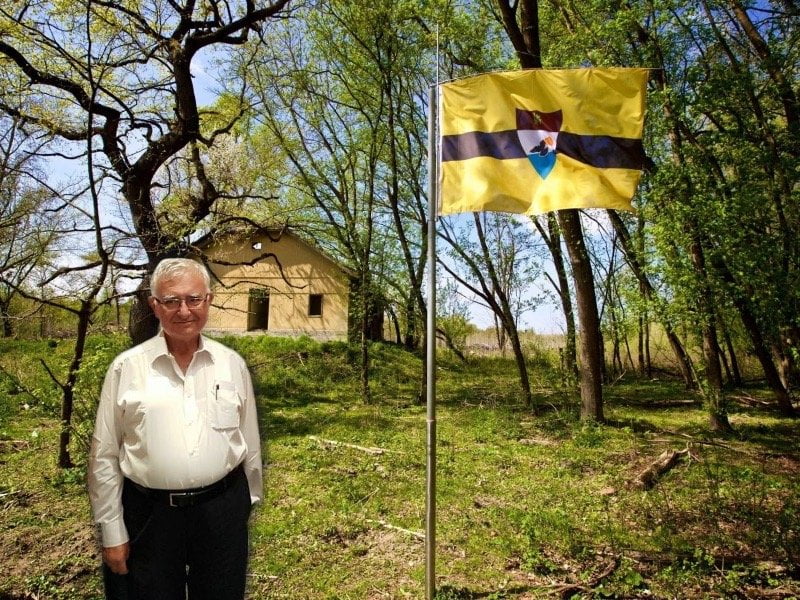Christmas brings thoughts of jolly old Santa and his cabin in Lapland to mind. Easter, on the other hand, doesn’t quite have the same analogy. But former European Commissioner John Dalli changed all that when he joined the ‘Free Republic of Liberland’ for its fifth anniversary celebrations on Easter Saturday to tell them his story… and The Shift joined the conversation.
First, we had a round of awkward questions on ‘where the hell is Liberland?’ Only to find out the place does not actually exist. It is a figment of the imagination. The second question, ‘what on earth is John Dalli doing there?’, then slowly fell into place.
Of late, Dalli appears to have re-invented himself as a blockchain guru helping people navigate the dodgy crypto Wild West even if he can’t navigate a virtual conference. He was even organising ‘Malta blockchain-themed tours’ as recently as December.
Dalli’s presentation for the Liberland conference was titled ‘Learning from the Mistakes of other Governments’. It was a lesson in audacity, delivered by a former politician deemed “disgraced” by not only the European Parliament and the European Commission, but also by the Council of Europe. But Dalli evidently wasn’t letting that get in the way.
Liberland – The walled and disputed ‘land of the free’
In 2015, a somewhat loopy Czech politician planted a flag in a marshy uninhabited area on the western side of the river Danube and proclaimed that this place was now the ‘Free Republic of Liberland’.
Unsurprisingly, given there was just him, his girlfriend and a college friend by the flag on that day, the politician – Vít Jedlička – was also elected as the ‘country’s’ first president by a whopping majority of two to zero (he correctly abstained on the vote).
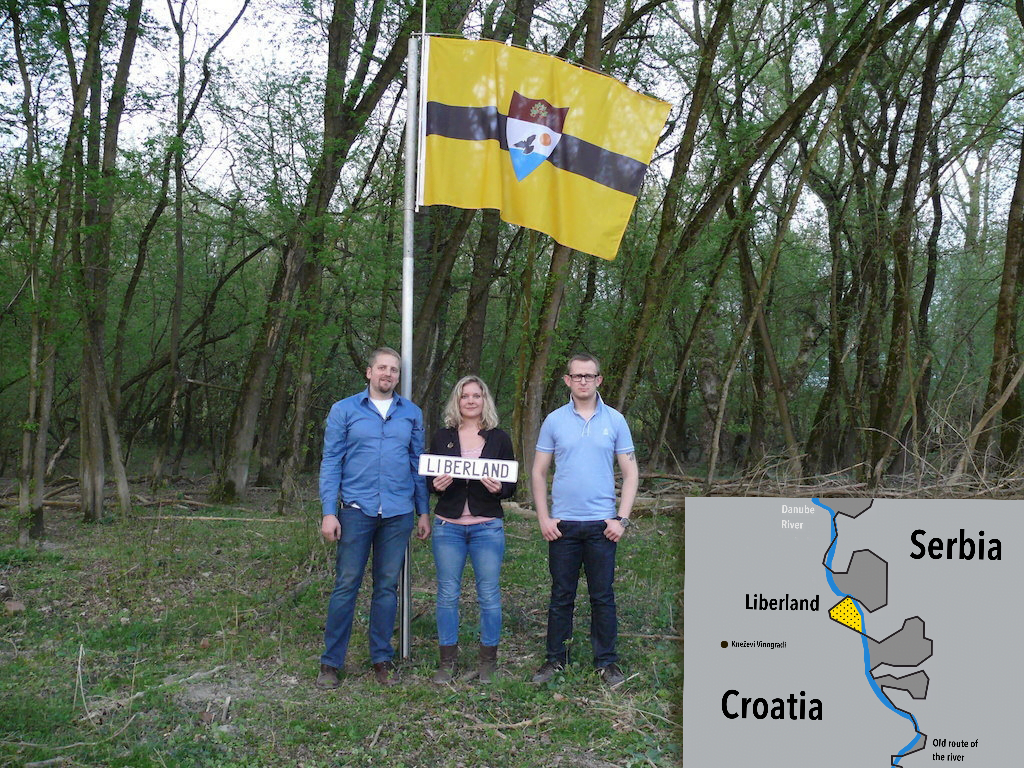
During the ceremony by the flag, Vít Jedlička (left) was elected as Liberland’s first president by a majority of two to zero (himself abstaining).
The tiny mosquito-infested parcel of land sits right on the uncomfortable border between Croatia and Serbia.
Historically, the two countries had a natural border that followed the winding course of the Danube. Engineering feats to ease navigation in 1947 by altering the river’s flow changed this.
The result, seen as unfair by Croatia since it lost 10 times as much land as Serbia, left the two countries locked in a longstanding dispute over who owns what.
The area, the size of Gibraltar, that Jedlička chose on the Croatian side of the river was previously part of Serbia. Croatia let it go when borders were redrawn, not to be seen as giving up its claim over much larger tracts of land on the Serbian side.
Although initially treated as a joke, Jedlička’s then highly-publicised stunt risked jeopardising Croatia’s position on the border. The end result was that Jedlička was briefly arrested and banned from ever going back to that piece of land.
In an effort to discourage repeat episodes, Croatia even cordoned off the area and demolished the only property on the land, an abandoned old barn.
Liberland has, to date, only been ‘recognised’ by three other equally unrecognised and self-declared microstates, the Kingdom of North Sudan (a place claimed by an American that promised his daughter she’d be a ‘real’ princess), the Kingdom of Enclavia (an enterprising neighbour) and the Principality of Sealand (a rusty offshore platform near Suffolk).
Undeterred by derision, being prohibited from setting foot on the land and the lack of any international recognition, Jedlička markets Liberland as a place where his libertarian beliefs can take root with little to no government and laws.
Liberland sells its citizenship, embraces crypto-currencies and all things blockchain since few banks would open a bank account for a citizen of the equivalent of La La Land. And, naturally, the country plans to charge its so-called ‘citizens’ zero taxes.
Essentially, it’s a wet dream for uber capitalists wanting an exclusive club with minimal government interference.
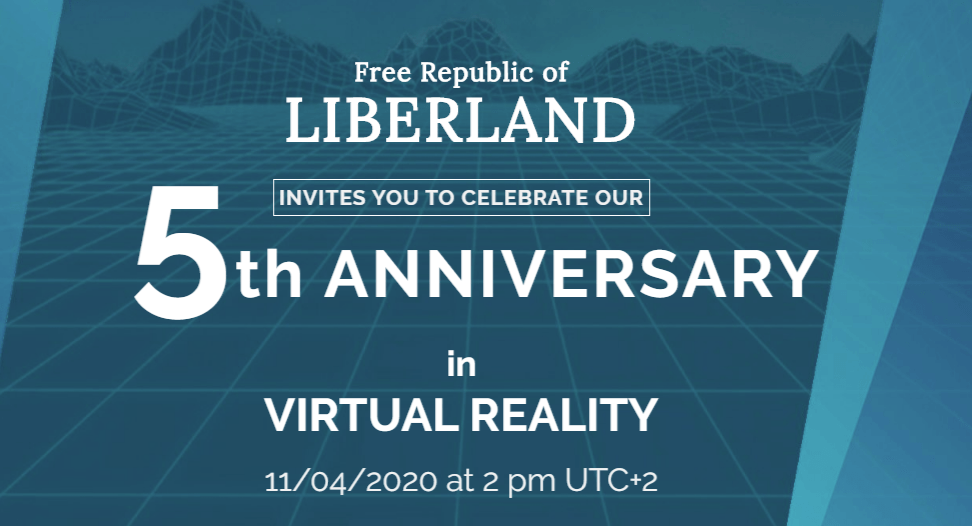
We received an e-invite to Liberland’s fifth anniversary celebrations… in virtual reality.
If Malta was briefly gunning for the misguided moniker of “Blockchain Island”, Liberland wants to be the “Blockchain Neverland”.
Unsurprisingly, Liberland is frequently either described as a madman’s project or a money laundering scheme, each of which tends to attract a host of interesting characters for different reasons. The conference laid this bare.
Liberland’s celebrations: basket cases of fruits, not missing the nuts
After online registration, we were sent a Zoom link to join the virtual celebrations.
The Zoom video stream started at 2.15pm CET upon which we were presented with a 10-minute countdown with a quaint hill-side chalet in the background, probably meant to evoke images of the Liberland barn.
At the two minute mark, the camera cut to Jedlička on the porch who gleefully announced, with his girlfriend awkwardly dancing in the background: “Ladies and gentlemen, we are starting in two minutes.” Then the camera cut back to the side of the chalet next to a desiccated vineyard.
At the end of the countdown, the camera zoomed into Jedlička who welcomed what we suspect to be little more than a handful of viewers (and us) to a conference that brought together “the most famous and greatest scholars in the liberty world”.
“Some people are impatient. They think that starting a country is a summer holiday job, but these things take time. And right now we have the best experts,” the ‘founder’ of Liberland said introducing the conference.
The first presenter excitedly asked Jedlička how Liberland managed to get a connection with Dalli – a question Jedlička dodged. Instead, he said Dalli’s experience as a European Commissioner could “help us a lot”.
We were keen to see where this would go despite the experience being surreal.
First up was a four-way video conference with members of the ‘Liberland Aid Foundation’ describing how they were raising crypto-donations to assist them with their diplomatic efforts to get recognition of Liberland.
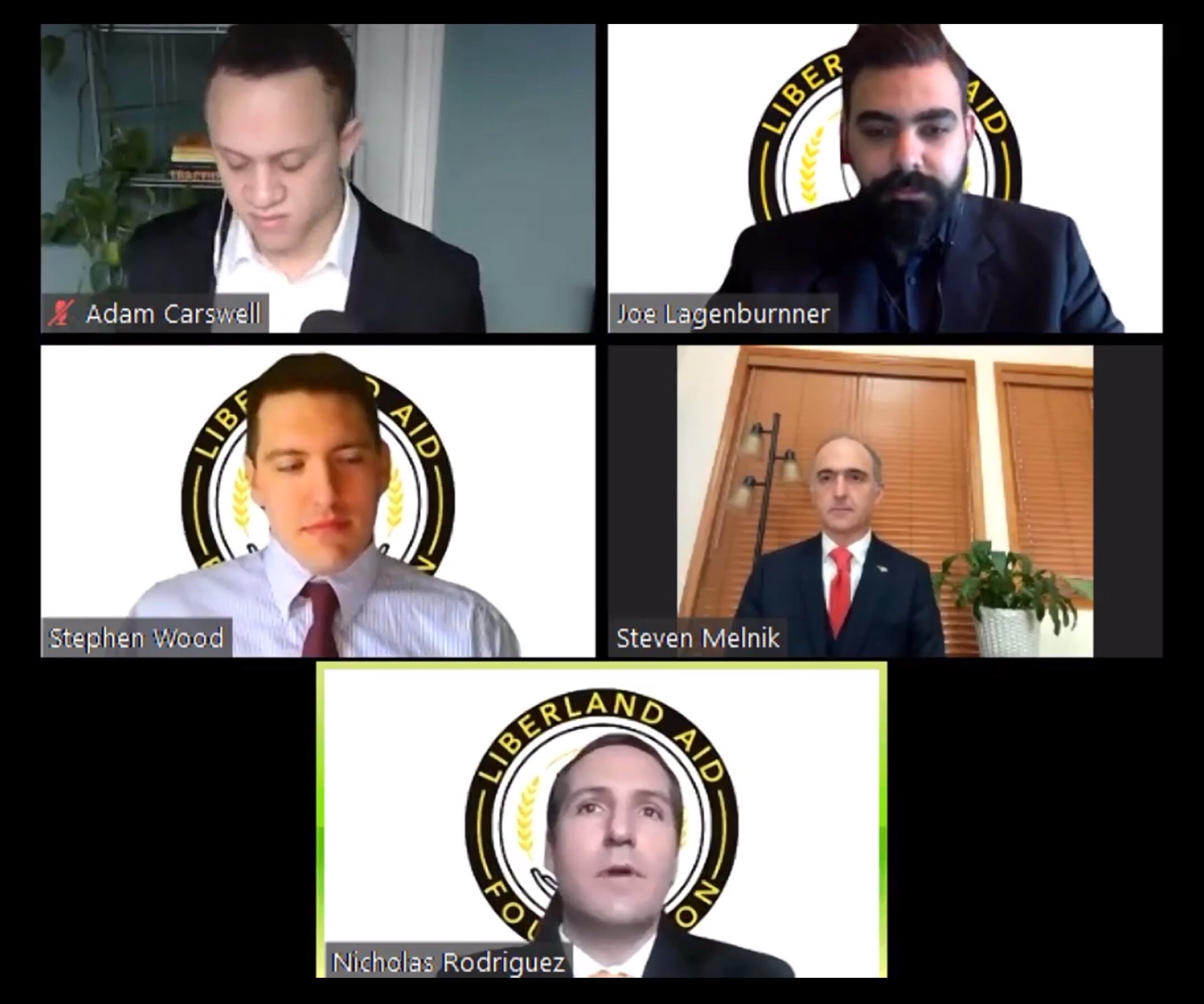
The first session was a four-way video conference about Liberland’s ‘soft-diplomacy’ efforts using the proceeds of anonymous crypto-currency donations.
This talk was followed by, among others, a 20-minute “networking session” that consisted of watching a pixelated pair of floating digital hands roam around the digital landscape of what looked suspiciously like Second Life. We were, however, assured that this digital utopia was a fully “blockchain-powered, crypto-currency based economy” existing in a video game, whatever that means.
Liberland has recently opened its first embassy there, we were told, planted between a badly drawn tree and a river that digital avatars of online users kept accidentally tumbling into.
Dalli’s speech and other freaks
After what felt like an age, a bow-tied presenter with a heavy Eastern accent anxiously announced that Dalli was next up. Evidently uncomfortable with live speaking as he read off a script while someone filmed him, Dalli sent a pre-recorded video.
A random person’s face popped up on the screen only to be quickly taken down, then the video started playing. There was Dalli in what looked like his dining room with a scribbled name label reading “Dalli John”, in case viewers weren’t quite sure who he was.
Dalli extolled the power of democracy at the start of his speech. “All people should be equal before the law,” said the man accused of evading justice in his home country.
Unsurprisingly, his strained speech was all about himself. He nurtured his relations in the Club of Weird by ranting against the ‘evil bureaucracy’ in Brussels – those he called “megalomaniacs” while occupying 10 minutes of people’s time spreading wild accusations of a web of conspiracy that couldn’t have been put together to bring down a person who actually mattered.
He was the victim of “attacks, defamation and hate-mongering”, he told the few people bothering to follow his views on a dystopian dream of a country that does not exist and could only meet virtually, COVID-19 or not.
He kept repeating that the top honchos in Brussels, Giovanni Kessler – the OLAF prosecutor who had the misfortune of believing bribery to be a prosecutable offence in Malta – as well as both political parties in Malta, came together to launch a campaign that sought to quell “the support of the Maltese people” for his work.
It was the “bureaucracy and corruption” in institutions that levelled him in their ambition “to grab power”. He kept referring to “evidence” that proved all this was “fraudulent” – a strategy created by lobbyists only different to the ones he blasts for not agreeing with his version of events.
His cause was noble, Dalli kept insisting to the handful of people watching an episode from the Land of Narnia. The ‘mythical people’ supported his cause and this led to “envy and hate” and the animals from ‘the brothers in the bureaucracy’ spoke ill of him to serve another agenda.
Dalli ended his rambling monologue by praising Liberland, although he conceded that investing in a piece of contested land claiming to be a country was perhaps “a somewhat nebulous concept”.
After a slip of the tongue in which he referred to the future citizens of Liberland as “my citizens”, which he corrected, Dalli ended his videotaped rant with a direct message to Liberlanders everywhere: “Yours is a long, uphill climb… good luck”.
Dalli finally dialled in for the Q&A session after yet another series of talks, including:
- A Liberlandian-passport marketing pitch by an advertising guru acting as Liberland’s Deputy Minister of the Interior,
- A speech by Brock Pierce – best known in the real world as the Disney child actor who played the annoying kid in Mighty Ducks in the 90s – now selling the crypto-utopia dream,
- A lecture by Walter Block, a US libertarian economist who claims that money laundering is a “victimless crime that might actually be good”.
Given that the few people actually watching him must have taken the opportunity to put the kettle on while he rambled on about Kessler and former Prime Minister Lawrence Gonzi, there were no questions for Dalli.
Like a true sport, Dalli stayed on fumbling with his camera turned on but with a muted microphone throughout the pained 15-minute Q&A to answer two planted questions.
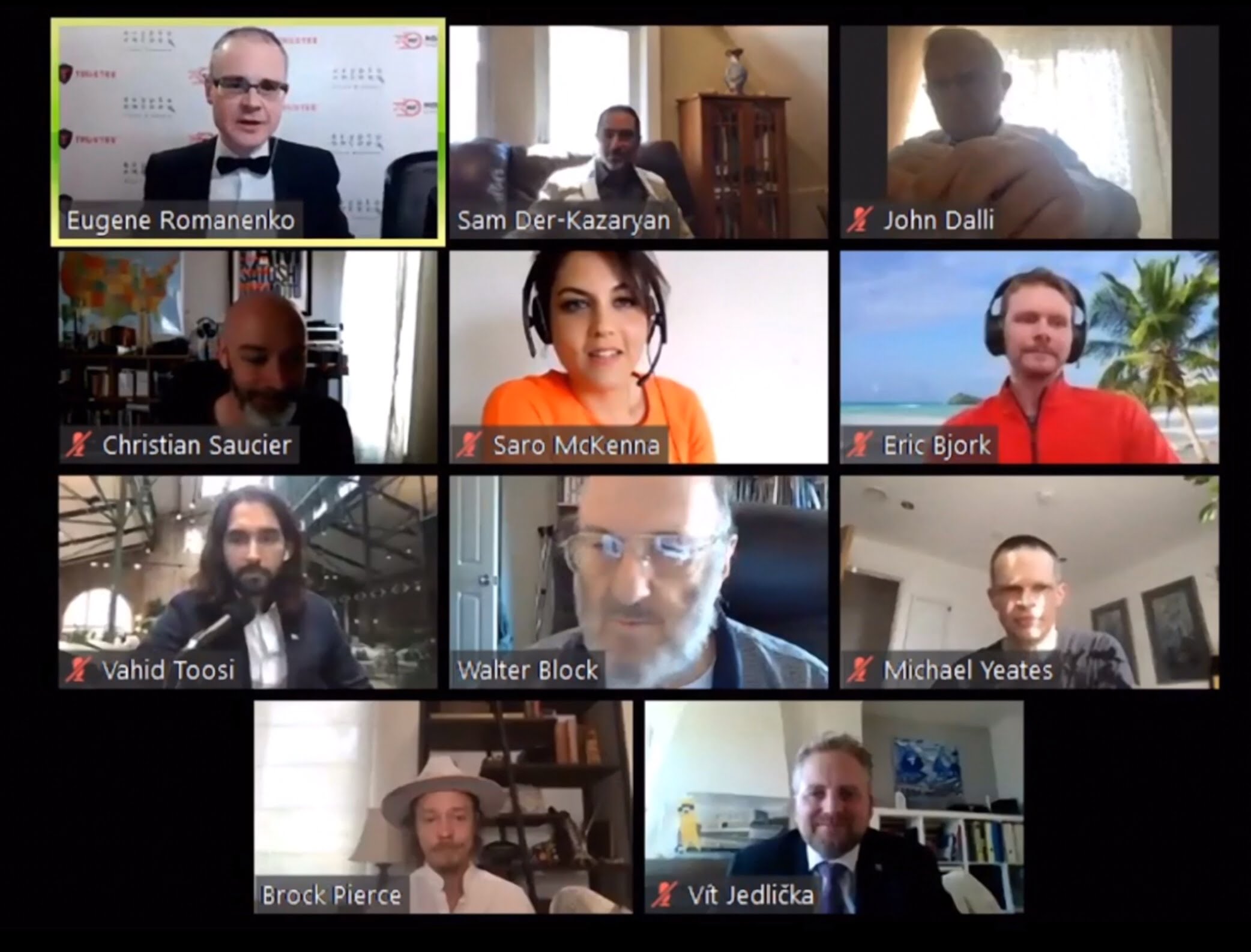
After sending in a shaky pre-recorded message, John Dalli (top right) later joined for the staged “Q&A” session.
Next up, there was yet another session of “networking” in Second Life that they swore wasn’t Second Life. We stayed on if only out of pure masochism at this point, but it didn’t last long.
Before the digital nightmare ended, we watched an over-excited guest speaker describe how a crypto operator can offer quasi-banking services without being actually licensed as a bank. Another speaker claimed, in between rather suspect charts, that global warming “is just a hoax” and that, in any case, a warmer planet “would be good for biodiversity”.
It was enough to finally switch off the freakshow.

